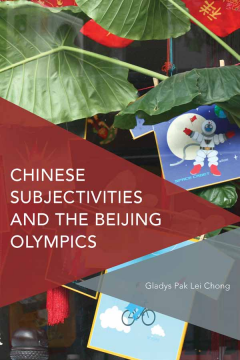
Additional Information
Book Details
Abstract
Chinese Subjectivities and the Beijing Olympics develops the Foucauldian concept of productive power through examining the ways in which the Chinese government tried to mobilize the population to embrace its Olympic project through deploying various sets of strategies and tactics. It argues that the multifaceted strategies, tactics, and discourses deployed by the Chinese authorities sustain an order of things and values in such a way that drive individuals to commit themselves actively to the goals of the party-state.
The book examines how these processes of subjectification are achieved by zooming in on five specific groups of the population: athletes, young Olympic volunteers, taxi drivers, Chinese citizens targeted by place-making projects, and the Hong Kong population. In doing so it probes critically into the role of individuals and how they take on the governmental ideas to become responsible autonomous subjects.
There is no shortage of research on mega events and their political aftermath. Gladys Chong’s analysis of the Beijing Olympics nevertheless stands out in this field due to the breadth of her analysis - from architecture and athletes to taxi drivers - and the thoroughness of her theoretical reflection. A critical and context sensitive reading of Michel Foucault’s theory of power allows for identifying the sport event as a decisive contribution to a broader ‘governmentalization’ of Chinese society. Thereby the book offers timely inspiration for a comparative study of global mega events and for the broader discussion on the politics of commercialized entertainment culture.
Markus Stauff, Assistant Professor of Media Studies, University of Amsterdam
Chong’s book is a highly original, informed, and eloquent examination of the Beijing Olympics, and its insights have ramifications beyond this particular event and this particular city. It is essential reading for people concerned with contemporary China, state power, and cultural politics.
Gladys Pak Lei Chong brings an insightful Foucauldian understanding to how the 2008 Beijing Olympic Games is intimately tied to the effective state governing strategies and the process of self-directing subjectification, and how the Chinese regime nimbly manipulates the global event to earn a high level of popular support. An important merit of this engaging study based on extensive interviews and ethnographic fieldworks is to set a new point of departure for analysis of the Olympics that have been used as patriotic education and yardsticks of national strength and social progress, and to make us aware of the limits of dichotomizing the authoritarian state and its governed subjects.
Kwai-Cheung Lo, Professor, Hong Kong Baptist University
Overall, the book opens up a series of questions that go well beyond the Olympic moment, and it makes a much-welcome contribution that will be of great interest for scholars and students of Chinese and Asian studies, media and communication studies, cultural studies and political science, and more generally anyone interested in questions of power, identity and governmentality in contemporary politics.
Chinese Subjectivities and the Beijing Olympics is chock full of information and ideas about the Beijing Olympics, all based on years of fieldwork. Chong is balanced in her approach, pointing out positive and negative aspects of the Olympics experience from many perspectives. Her work illustrates the rich applicability of Foucault’s theories in the modern social world, and shows how a massive global spectacle can produce a complex mix of engagement and resistance.
This is an eminently readable book full of insights into the intricate ways in which people in China both subject to, and sometimes resist, the governmental calls on them to be ideal national subjects. Applying a Foucauldian perspective on contemporary Chinese reality, Gladys Chong gives us an in-depth and multifaceted look – through the case study of the staging of the Beijing Olympics - into the complex relationship between the state and its subject citizens in the moulding of Chineseness and what it means to be Chinese today.
Ien Ang, Distinguished Professor of Cultural Studies, Western Sydney University
Gladys Pak Lei Chong is Assistant Professor of Liberal and Cultural Studies at the Department of Humanities and Creative Writing at Hong Kong Baptist University.
Drawing on Foucault’s theories, Gladys Pak Lei Chong offers here an informed discussion of the modern Chinese state’s techniques of governmentality, in particular in the production of patriotic subjects. The ramifications of her thoughtful analysis go far beyond the Beijing Olympics.
Rey Chow, Anne Firor Scott Professor of Literature in Trinity College of Arts and Sciences, Duke University
Table of Contents
| Section Title | Page | Action | Price |
|---|---|---|---|
| _GoBack | xiii | ||
| _GoBack | 132 | ||
| _Ref324536067 | 135 | ||
| _GoBack | 154 | ||
| chapter6 | 155 | ||
| _GoBack | 207 | ||
| _Ref324536214 | 209 | ||
| _GoBack | 209 | ||
| _Ref324536265 | 233 |
